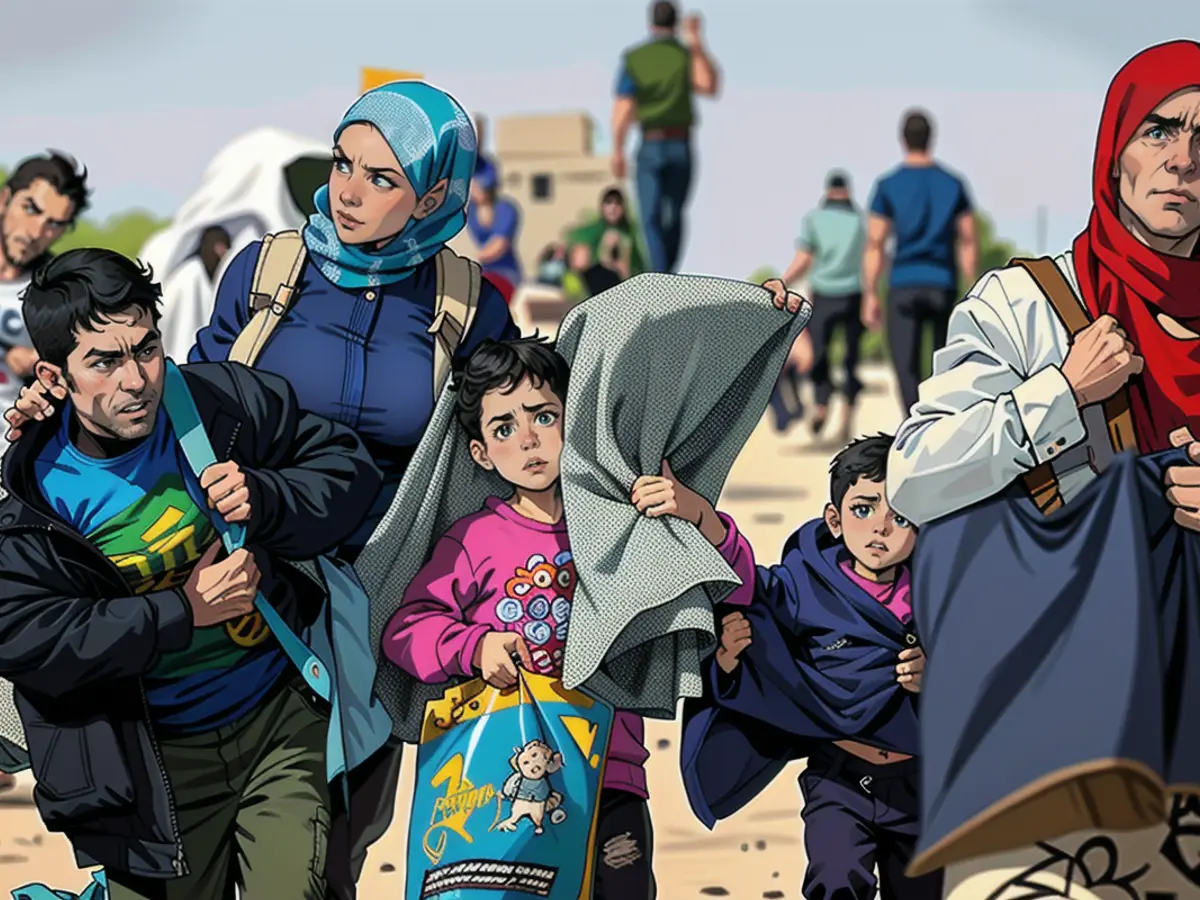What would seven additional months of conflict entail for Palestinians, Israelis, and the global community?
The ongoing war between Israel and Palestine could bring about disastrous outcomes for the people in the already ravaged Palestinian territory, as well as significant consequences for Israel and beyond, experts warn. Prolonging the conflict could majorly impact Israel's economy, alter its domestic politics, and destroy its international standing and relations. Additionally, it may influence US politics, especially considering President Joe Biden's upcoming elections.
"It's an exhausting uphill battle," states Assaf Orion, a senior research fellow at the Institute for National Security Studies (INSS) in Tel Aviv and former head of the Israel Defense Forces (IDF) strategic planning division. "We are witnessing the daily toll of this type of fighting... Not only that, there are the political, diplomatic, informational, and reputational issues that Israel is now paying a high price for in the ongoing struggle."
Here's a rundown of what another seven months of war could entail.
Increased misery for Palestinians
The situation in Gaza is steadily worsening, and if the war persists, it is likely to lead to even greater hardship for its people.
In February, when the death toll in Gaza stood at 28,000, researchers from the London School of Hygiene & Tropical Medicine (LSHTM) and the Johns Hopkins Center for Humanitarian Health predicted that if the war escalated, the total number of deaths by August would reach 72,000. If the effects of epidemics driven by the fight are also taken into account, the toll could rise to nearly 86,000 by then.
Aid groups have cautioned that civilians in Gaza are facing famine in certain areas and that additional airstrikes and displacement in the southern strip are only exacerbating the humanitarian crisis.
Getting aid into the territory is extremely challenging. The amount of humanitarian aid entering Gaza reduced by 67% following Israel's military incursion into Rafah this May, the United Nations reported this week.
"We once again call for a ceasefire and the release of all hostages," said Juliette Touma, director of communications at the UN Relief and Works Agency for Palestine Refugees (UNRWA). "The longer this war rages on, the more suffering there will be for Israeli and Palestinian civilians."
Netanyahu's predicament
Both Hamas and Israeli Prime Minister Benjamin Netanyahu may benefit from prolonging the war, as their political survival depends on it. In a post-war scenario, neither party appears likely to remain in power: Israel has promised to annihilate Hamas, and Netanyahu might be held accountable for not preventing the October 7 attacks that initiated the conflict. Also, Israel may hold new elections that could potentially replace Netanyahu.
"Israelis are eager for elections as soon as the war ends," said Yohanan Plesner, president of the Israel Democracy Institute. "In this sense, an extended war could delay elections, thus postponing Netanyahu's day of reckoning with the voters."
According to a survey conducted between March 31 and April 3, a majority of Jewish Israelis are ready to endure the strain of continued fighting for at least six months. Plesner informed CNN that this data suggests Israelis are prepared for a protracted conflict – the question now is who they want to lead them. A large number of Israeli citizens think those responsible for the failures of October 7 and the war should step down, he added.
Netanyahu has so far evaded taking responsibility for the war, asserting that such conversations will only take place after the military achieves its aims: the return of hostages and the eradication of Hamas.
Israel has suffered 292 casualties in Gaza since it initiated its ground offensive there, a response to Hamas' October 7 attack that killed 1,200 people and captured over 250 others, according to Israeli officials. The death toll in Gaza has reached more than 36,000, according to the territory's health ministry.
Netanyahu is faced with immense pressure from his coalition's hardline members to continue the war. Some have threatened to leave the government if he accepts a ceasefire agreement before Hamas is abolished.
Israeli diplomacy
Israel's diplomatic isolation is likely to worsen if the war continues. The government has faced increased censuring on the international stage and has drawn harsh reproaches from its closest European allies for its behavior.

It has pulled out envoys from three European nations, in reaction to them recognizing a Palestinian state, and has seen several South American and other countries reduce diplomatic ties.
The prospect of legal action against Israel may also intensify. Netanyahu's encounter with a possible arrest warrant from the International Criminal Court concerning Israel's actions in Gaza, and Israel's confrontation with the International Court of Justice, where it is being sued for a genocide case, exemplify this. The court has directed Israel to terminate its military operation in Rafah, an order it has thus far ignored.
An extended war might also deter prospects for normalization with Saudi Arabia, as Netanyahu had marked this as a key goal for his administration before the October 7 attack. This conflict has jeopardized these efforts and Israel has been subjected to stern reproaches from Riyadh as well as other Arab states that already have diplomatic ties with Israel, including Egypt and the United Arab Emirates. Egypt, which became the first Arab nation to acknowledge Israel, has cautioned its neighbor against placing military installations so close to its border. A member of Egyptian security personnel was killed during a shooting episode on the Egypt-Gaza border this week.
"It's a real tough spot," said Orion from the INSS. For Israel, finding the balance between preventing Hamas from launching more attacks and releasing remaining hostages and other expenses is challenging. Right now, it seems Hamas isn't willing to let them go.
Economic impact on Israel
The war really took its toll on Israel's economy quickly after October 7. Economic output plummeted 21.7% in the fourth quarter of 2023, compared to the previous year - the first time in almost two years it didn't grow. Recovery followed, but S&P Global predicts Israel's economy will take longer to recover than it has before.
In April, S&P Global even downgraded Israel's credit rating, which shows how well the government can repay its debts. They warned of more downgrades too. The agency expects Israel's budget deficit to widen due to increased military spending.
Moody's Investors Service, another rating agency, also downgraded Israel, and says the war will be a heavy financial and political burden in the long run. They think defense spending will nearly double from 2022 to the end of 2024, and possibly increase more in future years.
Troops, ammo, funds, and weapons are limited, especially for a small country like Israel, Orion explained. Even though the Gaza war's intensity has changed since October 7, it's still "costing Israel a lot."
Since 1948, Israel has had many wars, but this one is the most expensive. As of January, the Israeli military was spending $272 million per day on the war, according to Ynet. By that time, the costs reached an estimate of $60 billion - military expenses, civilian infrastructure damage, and compensation to Israeli businesses. This amount has probably grown since then.
Israel's leaders are aware of the financial strain. When the military pulled back from Gaza in January, Rear Admiral Daniel Hagari mentioned economic reasons, saying it would "significantly alleviate the burden."
Plesner mentioned the government hasn't done enough to lessen the economic harm. While Israel's economy has recovered from past conflicts and crises, a prolonged war might make a recovery more difficult.
"There aren't enough funds to cover the military and civilian costs related to the war." He said, "The war will affect Israel for a longer period, making a recovery harder."
Effect on Biden's re-election
The war has big consequences for US internal politics and weighs heavily on Biden's re-election efforts. The president has long-standing support for Israel, giving it nearly unconditional diplomatic and legal protection on the world stage. But his administration has also taken measures against Israel, like sanctions on West Bank settlers and withholding arms for use against civilians in Rafah. Despite these actions, the war continues, casualties rise, and famine spreads in Gaza, causing more pressure on some of his voters.
A recent CNN poll showed Biden's handling of the war gets 28% approval and 71% disapproval, including a staggering 81% disapproval from people under 35 and a majority disapproval from Democrats (53%).

Read also:
The Middle East conflict between Israel and Palestine could further strain relations between Israel and the international community, particularly the United States, as the ongoing war negatively impacts President Biden's re-election prospects.
If the situation in Gaza continues to deteriorate due to prolonged conflict, it may lead to a humanitarian crisis that significantly impacts both Israeli and Palestinian civilians, as well as placing immense pressure on international aid organizations and the global community to intervene.







